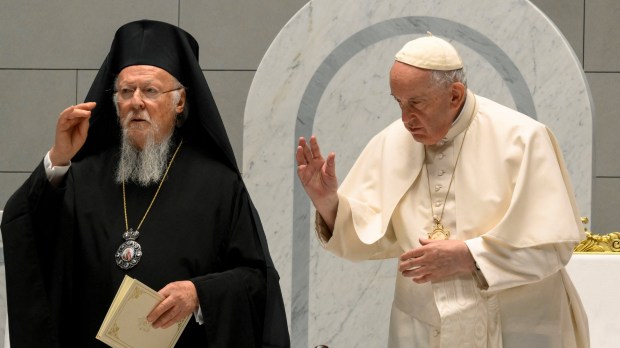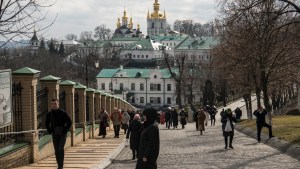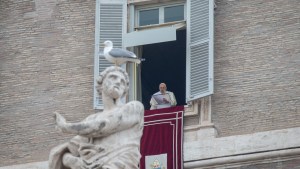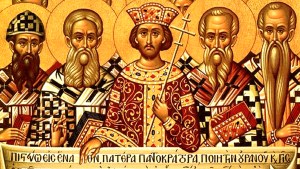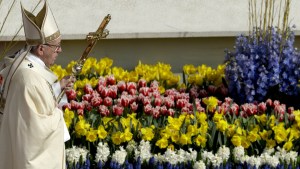Roman Catholics and Orthodox need to continue along a “dialogue of charity” on their way to restore the communion they enjoyed before the “Great Schism” of the 11th century, said Catholic and Orthodox members of an international theological dialogue.
The Churches in East and West should strive to purify their histories of mutual misunderstanding and mistrust in order to “embrace an authentic understanding of synodality and primacy in light of the ‘theological principles, canonical provisions and liturgical practices’ of the undivided Church of the first millennium,” the dialogue partners said.
Bishops and theologians involved in the Joint International Commission for Theological Dialogue between the Roman Catholic Church and the Orthodox Church issued their first joint statement in seven years after a meeting this month in Alexandria, Egypt. The so-called Alexandria Statement, issued June 7 and formally titled “Synodality and Primacy in the Second Millennium and Today,” was a followup to a statement issued in 2016 in the Italian town of Chieti. The older document was an examination of the state of the Church in the First Christian Millennium, before Rome and Constantinople suffered schism.
The joint international commission was established by the Holy See and 14 autocephalous Orthodox Churches and has issued a number of documents over the past four decades.
The commission met from June 1-7, conducting much of its discussions in the Patriarchal Cathedral of the Annunciation in Alexandria.
Eighteen Roman Catholic members were present. Ten Orthodox Churches were represented: the Ecumenical Patriarchate, the Patriarchate of Alexandria, the Patriarchate of Jerusalem, the Patriarchate of Romania, the Patriarchate of Georgia, the Church of Cyprus, the Church of Greece, the Church of Poland, the Church of Albania and the Church of the Czech Lands and Slovakia. The Commission worked under the direction of its two co-presidents, Metropolitan Job of Pisidia of the Ecumenical Patriarchate and Cardinal Kurt Koch, prefect of the Vatican Dicastery for Promoting Christian Unity.
Absent from the list provided by the Vatican were the Russian Orthodox Church, the Ukrainian Orthodox Church of the Moscow Patriarchate, the Orthodox Church of Ukraine, and the Serbian Orthodox Church.
Followup to Chieti
The Alexandria Document appears on the website of the Vatican’s Dicastery for Promoting Christian Unity. Reading it gives one an overview of how Church unity became more and more fractured over time and how a new appreciation in the 20th century of Scripture, patristic, and liturgical studies has contributed to a renewed quest for restoration of Communion between East and West.
The two concepts expressed in the new document’s title – synodality and primacy – have to do with the question of how the Church should be goverened and decide on the best way to live its life. Chieti had this to say about synodality and primacy:
Synodality is a fundamental quality of the Church as a whole. As St. John Chrysostom said: ‘”Church” means both gathering [systema] and synod [synodos]’. The term comes from the word ‘council’ (synodos in Greek, concilium in Latin), which primarily denotes a gathering of bishops, under the guidance of the Holy Spirit, for common deliberation and action in caring for the Church. Broadly, it refers to the active participation of all the faithful in the life and mission of the Church.
The term primacy refers to being the first (primus, protos). In the Church, primacy belongs to her Head – Jesus Christ, ‘who is the beginning, the firstborn from the dead; that in all things he might have the pre-eminence [protevon]’ (Col. 1:18). Christian Tradition makes it clear that, within the synodal life of the Church at various levels, a bishop has been acknowledged as the ‘first’. Jesus Christ associates this being ‘first’ with service (diakonia): ‘Whoever wants to be first must be last of all and servant of all’ (Mk 9:35).
In the second millennium, communion was broken between East and West. …. The Joint International Commission for Theological Dialogue between the Roman Catholic Church and the Orthodox Church, in its ongoing work to overcome theological divergences, has been considering the relationship between synodality and primacy in the life of the Church. Different understandings of these realities played a significant role in the division between Orthodox and Catholics. It is, therefore, essential to seek to establish a common understanding of these interrelated, complementary and inseparable realities.
A stumbling block
A stumbling block to restoration of communion has been the question of how the Bishop of Rome – the Pope – should exercise his primacy as Successor of St. Peter. The Alexandria document goes into some detail about times during the Second Millennium when the Pope has asserted his universal jurisdiction over all the Churches, including those of the East. That assertion has been rejected by the Orthodox Churches.
In the wake of the First Vatican Council, for example, which asserted the primacy of the Pope’s universal jurisdiction and papal infallibility, the Orthodox rejected “such an ecclesiology,” which they consider to be “a serious departure from the canonical tradition of the Fathers and the ecumenical councils, because it obscures the catholicity of each local Church.”
Alexandria calls for closer consideration of the work of both the Second Vatican Council and the Holy and Great Council of the Orthodox Church, held on the Island of Crete in 2016. Both gatherings had a lot to say about Church unity being based in the Eucharist.
“One of the most important results of the 20th century ressourcement is ‘Eucharistic ecclesiology,’ which sees the local Church gathered around its bishop for the celebration of the Eucharist as a manifestation of the whole Church (cf. Ignatius, Smyrn. 8), and as the starting point and central focus of ecclesiological reflection,” the document says. “The Second Vatican Council (1962-1965) taught that such a gathering is ‘the principal manifestation of the Church’ (Sacrosanctum Concilium, 41), and that the Eucharistic sacrifice is ‘the source and summit of the whole Christian life.’”
The Holy and Great Council in Crete, Alexandria notes, “stated that ‘the tradition of the Apostles and Fathers’ always emphasized ‘the indissoluble relation both between the entire mystery of the divine Economy in Christ and the mystery of the Church, and also between the mystery of the Church and the mystery of the holy Eucharist, which is continually confirmed in the sacramental life of the Church through the operation of the Holy Spirit’ (Encyclical, I, 2). It likewise stated that ‘each local Church as she offers the holy Eucharist is the local presence and manifestation of the One Holy Catholic and Apostolic Church’ (Message, 1).”
Vatican II
In addition, Vatican II took up a question that could not be considered by the Fathers of the First Vatican Council, because the outbreak of the Franco-Prussian War interrupted proceedings, that is, how the episcopate is understood and how it is related to the papal ministry.
“Vatican II integrated and completed the teaching of Vatican I that the pope had supreme and full authority over the Church and that in certain circumstances he could infallibly proclaim the faith of the Church by saying that the body of bishops (‘college of bishops’) in union with its head, the pope, also exercises both of these prerogatives (Lumen Gentium, 22, 25, respectively),” the new document says. “A greater balance was thus established between the bishops and the pope. … In 1965, Pope Paul VI instituted the Synod of Bishops as a ‘permanent Council of bishops for the universal Church’, representative of ‘the whole Catholic episcopate’, which would assist the pope in an advisory and consultative capacity (Apostolic Letter, Apostolica Sollicitudo).”
Vatican II also recognized that the Orthodox Churches “possess true sacraments, above all by apostolic succession, the priesthood and the Eucharist,” Alexandria notes.
“Major issues complicate an authentic understanding of synodality and primacy in the Church,” the new document concludes. “The Church is not properly understood as a pyramid, with a primate governing from the top, but neither is it properly understood as a federationof self-sufficient Churches. Our historical study of synodality and primacy in the second millennium has shown the inadequacy of both of these views. Similarly, it is clear that for Roman Catholics synodality is not merely consultative, and for Orthodox primacy is not merely honorific.”
The document concludes in a spirit of continuing prayer, study, and dialogue. “Having reflected together on the history of the second millennium, we acknowledge that a common reading of the sources can inspire the practice of synodality and primacy in the future,” it says. “Observing the mandate of our Lord to love one another as he has loved us (Jn 13:34), it is our Christian duty to strive for unity in faith and life.”
[Photo above shows Ecumenical Patriarch of Constantinople Bartholomew I and Pope Francis give a blessing at a prayer for peace at Our Lady of Arabia Cathedral in Awali in Bahrain on November 4, 2022.]
